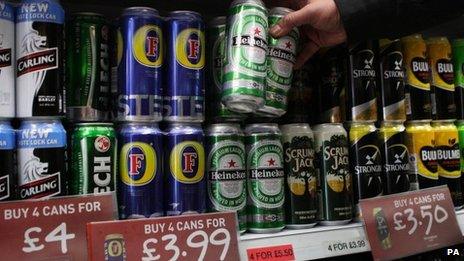Minimum pricing having a difficult birth in Scotland
- Published

The cost of the strongest ciders would more than double in supermarkets and shops if Scottish government plans for minimum pricing are brought in
The policy of minimum alcohol pricing is having a difficult birth in Scotland.
The Scottish National Party has been trying to introduce the measure since 2009, insisting it is needed to tackle a dangerous drinking culture.
Research suggests that Scottish adults consume the equivalent of a standard bottle of vodka or 10 pints of beer every week, a fifth more than the average in England and Wales.
The first time the policy came before the Scottish Parliament the SNP was a minority government and it was voted down by opposition MSPs in September 2010.
Re-elected with a majority in the Holyrood elections last year the party tried again and on 24 May the Alcohol (Minimum Pricing) (Scotland) Act) 2012 was passed.
The Scottish government set the price per unit of alcohol at 50p, which would see the cost of the strongest ciders more than double in supermarkets and shops, while a bottle of whisky would cost at least £14 and wine a minimum of £4.50.
The bill has received royal assent but it is still not in force. Two hurdles remain.
First the policy has been challenged by wine-producing European Union nations such as France, Italy and Spain amid claims that it breaches EU law on free trade.
The EC itself has already said "we have a problem with the compatibility of minimum pricing plans under community law".
More detail of those concerns emerged in a legal opinion on the policy prepared for the EC and submitted to the Scottish government earlier this year.
The opinion suggests that minimum pricing is a disproportionate way to tackle such concerns and therefore may not be exempt from competition law.
Free trade
In it, the Commission's general secretary, Catherine Day, says the policy is "within the scope of the goals and objectives of the EU strategy to support member states in reducing alcohol-related harm".
But she adds: "However, the measure at issue raises doubts as to its compatibility with the principle of proportionality."
The Scottish government has until December 27 to submit its response to the European Commission about those concerns.
Separately, the policy is being challenged in the Scottish courts.
Two trade bodies, the Scotch Whisky Association and the European Spirits Organisation, have been granted judicial review of the legislation at the Court of Session in Edinburgh.
They argue that the law is outwith the competence of the Scottish Parliament because it deals with a matter reserved to Westminster, the sale and supply of goods; it would contravene freedom of trade clauses in the 1707 Acts of Union between Scotland and England; and it is incompatible with the EU's "general principles of free trade and undistorted competition".
The Scotch Whisky Association also says minimum pricing would be ineffective in tackling alcohol misuse, penalise responsible drinkers, put pressure on household budgets and damage an export industry worth more than £4bn to the Scottish economy every year.
Whisky is Scotland's number one export after oil and gas. The industry directly employs 10,000 people and supports another 25,000 jobs in the supply chain.
But the Scottish government says alcohol misuse costs Scotland £3.6bn each year or £900 for every adult.
In jeopardy
Ministers insist they are acting in accordance with both UK, Scottish and European legislation and that measures which relate to public health, social problems and crime are exempt from competition law.
Scottish Health Secretary Alex Neil said: "Minimum pricing will save lives and reduce the harm caused by alcohol misuse and we believe the policy, agreed by parliament and backed by expert opinion, is the most effective pricing measure.
"We will continue to press the case for minimum unit pricing in the strongest possible terms."
That process will continue in the courts over the next few months.
The Court of Session hearing was originally scheduled for October but it has been postponed until January to allow Scottish government lawyers more time to consider the arguments.
All this means that the Scottish Government's target date for actually beginning to enforce the 50p per unit price, April 2013, is in jeopardy.
- Published23 October 2012
- Published28 September 2012
- Published24 May 2012